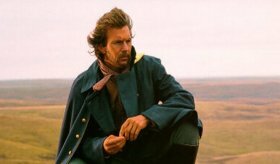|
|
| Tookey's Review |
|
| Pro Reviews |
|
| Mixed Reviews |
|
| Anti Reviews |
|
| Cast |
|
| |
 |
| |
| Released: |
1991 |
| |
|
| Genre: |
WESTERN
ROMANCE
EPIC
|
| |
|
| Origin: |
US |
| |
|
| Length: |
232 |
|
| |
|
| |
|
|
| |
|
|
A white soldier (Kevin Costner) stationed on the frontier of the Old West learns to love the Indians.
|
Reviewed by Chris Tookey
|
A good yarn. The epic set-pieces - such as the buffalo-hunt, the battles and the cross-country journeys - are magnificent. And, whenever the story seems to be lapsing into cliche, it always manages some clever inversion of our expectations.
Most praise was rightly showered on Costner, who co-produced, starred and made an outstanding directorial debut. But Australian cinematographer Dean Semler, who displayed his eye for lighting and landscape in Mad Max Beyond Thunderdome and Young Guns, surpassed himself with shots worthy of a David Lean epic. The film's loving attention to detail also reflected credit on production designer Jeffrey Beechcroft, costume designer Elsa Zamperelli, and Michael Blake for his well-researched screenplay.
To the great credit of Costner's team, however, they don't allow period authenticity to overwhelm the story. Nor do they allow their modern concerns - for the environment, and about the need to respect other cultures - to become preachy or anachronistic. They have been content to tell a simple tale which illuminates great truths, with a sincerity and humour which speedily involves the emotions of an audience. Dances With Wolves can be ranked alongside the best westerns which the cinema has ever produced.
The three hour print feels longer than the four-hour version, the “director’s cut”, which avoids the pro-Sioux sentimentality of the original, fills in holes in the plot, and makes more sense of the romantic interludes. Most crucially, the full version is sceptical about whether Costner can ever become, or truly wants to become, an Indian - he never understands their marriage traditions, and even at the end we see him stopping a Sioux warrior from scalping a white officer. This makes much better sense of the ending, when Costner decides that his future lies in returning to white society.
Even in its shorter, commercially viable form, the film was a handsome piece of story-telling, and one of the more impressive Oscar-winners of recent years (though some critics have never forgiven it for beating another worthy candidate, GoodFellas). Revealed on the scale intended by its director, Dances With Wolves is much richer, more complex and sophisticated. It deserves to take its place among the classic westerns.
|
|
|
